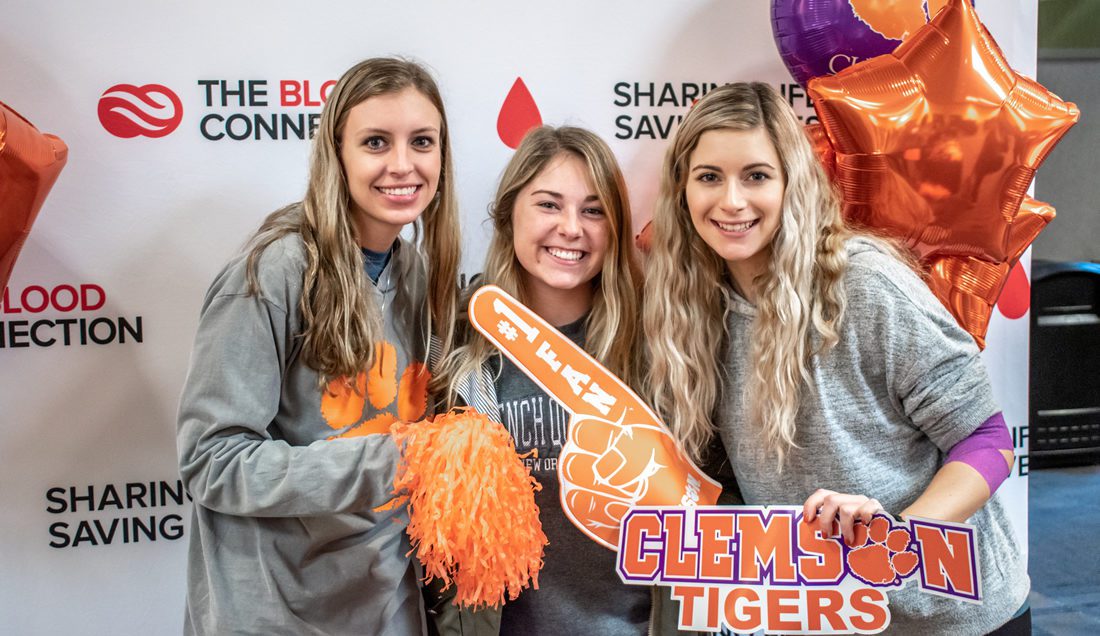CLEMSON — This year, the Tigers are ready and more determined than ever to beat the Gamecocks. No, not on the football field (that’s a given), but in blood donations. Alpha Phi Omega’s 35th annual Blood Bowl against South Carolina is coming to Clemson University from Nov. 18 to 22, a week before the rival football teams play.
One of the largest collegiate blood drives in the nation, Clemson and USC will compete in the Blood Bowl to see which university can gather the most blood donations.

The drive takes place from 10 a.m. to 7 p.m. each day. The Blood Connection, which supplies blood to the Clemson area and every Upstate hospital, will have blood mobiles set up around campus and one location inside Hendrix Student Center. The Red Cross, which supplies blood to the nation, will have one blood mobile at Core Campus and one location inside the University Union.
At Clemson, the blood drive is organized and planned by students in Alpha Phi Omega, namely their Blood Bowl co-chairs, Thomas Fleury and Emma Gallaher. APO is a national service fraternity that is the university’s second oldest student organization. Members of the group work with The Blood Connection and the American Red Cross, serve as liaisons to the university, recruit local sponsors and work at all donation locations during the week.
Blood centers often see declines in donations at the end of the year during the holiday season and APO seeks to combat the problem by having the Blood Bowl a week before the Thanksgiving holiday.
“Each donor can save up to three lives by participating, and last year the drive in Clemson saved over 8,000 lives. Along with USC, the 2018 Blood Bowl helped save over 14,000 lives,” said Ellis Moore, president of the Clemson’s Gamma Lambda Chapter of APO.

“I fell in love with Blood Bowl when I was a freshman, and I have absolutely loved getting to see all the behind the scenes work that goes into such a large event,” said Gallaher. “I’m so excited to see the whole event come together. I love the excitement it brings to campus.”
USC has won the annual APO Blood Bowl 18 times with Clemson following close behind with 16 wins. USC has a larger student body, so they level the playing field by competing based on the total number of units collected when the football game is played in Columbia and on percentage of students donating blood when the game is at Clemson.
In 2016, Clemson won with 18.83 percent of the student body participating (3,393) compared to 12.02 of USC’s student body (3,035), totaling 6,428 donors combined. In 2018, Clemson won again with 12.87 percent of the students participating (2,728) compared to 7.31 percent of USC’s students (1,956), for 4,684 donors combined.
“I’m hopeful we’ll be able to beat USC for the second year in a row,” Gallaher said. “All of the people involved are incredibly passionate in donating and having the opportunity to help save lives. It comes at such an important time for the blood centers as they experience a deficit in donations during the holiday season.”
Gallaher and Fleury hope to draw more donations this year by having new collection points at the busy Academic Success Center and the Agriculture Quad area. There also will be locations at the Student Union Hendrix Student Center, Core Campus, Fernow Street, Riggs Hall, Sikes Hall, Vickery Hall and the Watt Family Innovation Center.
The pair has been planning for the week for the past year.

“Since I joined APO when I first came to Clemson, it has been my favorite week of the year,” Fleury said. “I think it’s amazing to see so many people supporting the event. It’s extremely important since the holiday season commonly sees a shortage in blood donations. Can’t wait to #CUSaveLives.”
“The main ways we motivate students to donate is through the constant active recruiting by our brothers,” Moore said. “We visit classrooms, pass out flyers, post on social media. We partner with several companies in Clemson to offer deals to students who show the wristband they receive after donating.”
Follow the Blood Bowl on Twitter and Instagram: @CUBloodBowl and @APO_GammaLambda.
The Blood Connection
The Blood Connection has been committed to saving lives since 1962. Founded in Greenville, South Carolina, The Blood Connection is an independently managed, not-for-profit, community blood center that provides blood products to more than 70 hospitals in Georgia, South Carolina and North Carolina. Recognized by the U.S. Congress for its dedication to disaster preparedness and the community, TBC works diligently to collect blood from volunteer donors to meet the ever-increasing demand. By keeping collections local, TBC serves hundreds of thousands of patients a year in its communities. TBC is licensed and regulated by the U.S. Food and Drug Administration. For more information, visit thebloodconnection.org.
The American Red Cross
The Red Cross provides blood products to 60 percent of all hospitals across South Carolina. The Red Cross stands ready 24/7 to provide blood products, including rare blood types, to hospitals. When severe weather or disasters disrupts blood collections throughout the area for other organizations, the Red Cross is able to provide blood from other blood regions to help local hospitals.
As part of our mission to serve South Carolinians, we are not only committed to providing lifesaving blood products but also responding to disasters, supporting our service members, veterans and their families and teaching lifesaving skills. Nearly 3,000 volunteers help us with that lifesaving work every day. In the last year, those volunteers helped provide shelter and comfort to nearly 7,000 individuals in need.
Get in touch and we will connect you with the author or another expert.
Or email us at news@clemson.edu

